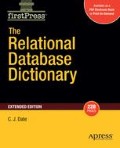Abstract
value An “individual constant” (e.g., the integer value 3). Values can be of arbitrary complexity (they can be scalar or nonscalar; note in particular that tuples and relations are both values). Values have no location in time or space; however, they can be represented in memory by means of some encoding, and those representations do have locations in time and space— indeed, distinct representations of the same value can appear at any number of distinct locations in time and space, meaning, loosely, that the same value can appear as the current value of any number of distinct variables, and/or as any number of attribute values within the current value of any number of distinct tuplevars or relvars, at the same time or different times. Note that, by definition, a value can't be updated; for if it could, then after such an update if would no longer be that value. Note too that every value is of some type (in fact, of exactly one type, except possibly if type inheritance is supported). Note further that a value isn't a type, nor is it a variable. Contrast appearance.
Access this chapter
Tax calculation will be finalised at checkout
Purchases are for personal use only
Rights and permissions
Copyright information
© 2008 C. J. Date
About this chapter
Cite this chapter
(2008). V. In: The Relational Database Dictionary. Apress. https://doi.org/10.1007/978-1-4302-1042-9_22
Download citation
DOI: https://doi.org/10.1007/978-1-4302-1042-9_22
Publisher Name: Apress
Print ISBN: 978-1-4302-1041-2
Online ISBN: 978-1-4302-1042-9
eBook Packages: Professional and Applied ComputingProfessional and Applied Computing (R0)Apress Access Books

